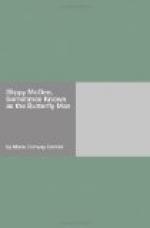“Good heavens! Surely, Mother, I misunderstand you! Surely you reproved her!”
“Reprove her?” My mother’s voice was full of astonishment. “Why should I reprove her? She was perfectly right!”
“Perfectly right? Why, you said—indeed, I assure you, you said that Laurence had been entirely right, she entirely wrong!”
“Oh, that! I see; well, as for that, she was.”
“Then, surely—”
“My son, a woman who is in the wrong is entirely right when she makes the man apologize,” said my mother firmly. “That is the Law, fixed as the Medes’ and the Persians’, and she who forgets or ignores it is ground between the upper and the nether millstones. Mary Virginia remembered and obeyed. When she grows up you will all of you adore her madly. Why, then, should she be reproved?”
I have never been able to reflect upon Laurence getting his head bumped and then gratefully apologizing to the darling shrew who did it, without a cold wind stirring my hair. And yet—Laurence, and I, too, love her all the more dearly for it! Miserere, Domine!
It was May when Mary Virginia came back to Appleboro. She had written us a bubbling letter, telling us just when we were to expect her, and how happy she was at the thought of being home once more. We, too, rejoiced, for we had missed her sadly. My mother was so happy that she planned a little intimate feast to celebrate the child’s return.
I remember how calm and mild an evening it was. At noon there had been a refreshing shower, and the air was deliciously pure and clear, and full of wet woodsy scents. The raindrops fringing the bushes became prisms, a spiderweb was a fairy foot-bridge; and all our birds, leaving for a moment such household torments as squalling insatiable mouths that must be filled, became jubilant choristers. “The opulent dyepots of the angels” had been emptied lavishly across the sky, and the old Parish House lay steeped in a serene and heavenly glow, every window glittering diamond-bright to the west.
Next door Miss Sally Ruth was feeding and scolding her cooing pigeons, which fluttered about her, lighting upon her shoulder, surrounding her with a bright-colored living cloud; the judge’s black cat Panch lay along the Mayne side of the fence and blinked at them regretfully with his slanting emerald eyes. From the Mayne kitchen-steps came, faintly, Daddy January’s sweet quavering old voice:
“—Gwine tuh climb
up higher ‘n’ higher,
Some uh dese days—”
John Flint, silent, depressed, with folded lips and somber eyes, hobbled about awkwardly, savagely training himself to use the crutches Westmoreland had lately brought him. Very unlovely he looked, dragging himself along like a wounded beast. The poor wretch struck a discordant note in the sweet peacefulness of the spring evening; nor could we say anything to comfort him, we who were not maimed.




